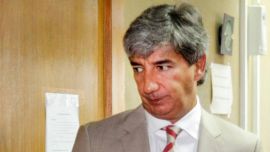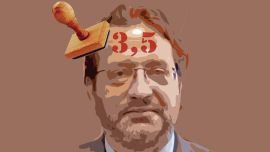The impact was immediately felt by the dollar, which climbed 40 cents to close at 39.70 pesos yesterday.
As the Mauricio Macri government approaches the October election, the key price index category of food and beverages saw some of the highest increases, with average prices ending January 3.4 percent higher.
Yet it was communications at 7.4 percent, hotels and restaurants at 3.7 percent, and recreation and culture at 3.5 percent, which topped the list.
Accumulated inflation in Argentina totalled 47.6 percent in 2018. This was Latin America’s highest annual rate behind Venezuela, and Argentina’s highest annual rate in 27 years.
Core inflation in January was stable at three percent, the INDEC reported, suggesting that the Central Bank will maintain a hard line on monetary policy.
Garments and Footwear was one of the few sectors where prices dropped, in this case by 0.6 percent. Alcoholic beverages and tobacco rose 3.4 percent; while Housing, Electricity, Water and Gas all rose 3.1 percent. Healthcare charges, meanwhile, rose 2.9 percent. And transport fares rose 2.5 percent nationally but 3.3 percent in the Capital.
The Central Bank’s own survey of economists now sees inflation for the end of the year on the brink of 30 percent (29.9 percent).
Meanwhile, three economic experts consulted by Perfil newspaper agreed that the January figure would set the pattern for the remainder of the first half of this year amid continuing uncertainty.
While steep increases in utility bills and transport fares are clearly to blame for inflation with a knock-on effect for other items, the economists also expressed concern about food prices. More increases in public services are scheduled for the next three months while the start of the school year historically inflates the March figures.
Economic consultant Guido Lorenzo believes that if the Central Bank sticks to its money supply freeze, the effect will be deflationary but only as from June due to the usual lag.
But CERX director Victoria Giarrizzo was more pessimistic, believing that high inflation will persist all year for a final figure of at least 40 percent with renewed dollar turbulence not impossible although less likely than last year due to the dollars loaned by the International Monetary Fund (IMF). Tax and interest rate cuts and the postponement of some public service increases could bring inflation down to 35 percent, she added.
CITY DATA
Buenos Aires City also released its consumer price data on Thursday, reporting a whopping 3.8 percent rise in prices in January, or almost one percentage point higher than the national average. The main increase was seen in regulated goods and services. These jumped 3.4 percent as a result of rising utility and public transport fees – due to the multibillion-peso subsidies which the national government has slowly been rolling back since it took office in 2015. In the capital, it was transport and public services, and food, which topped the list.























Comments